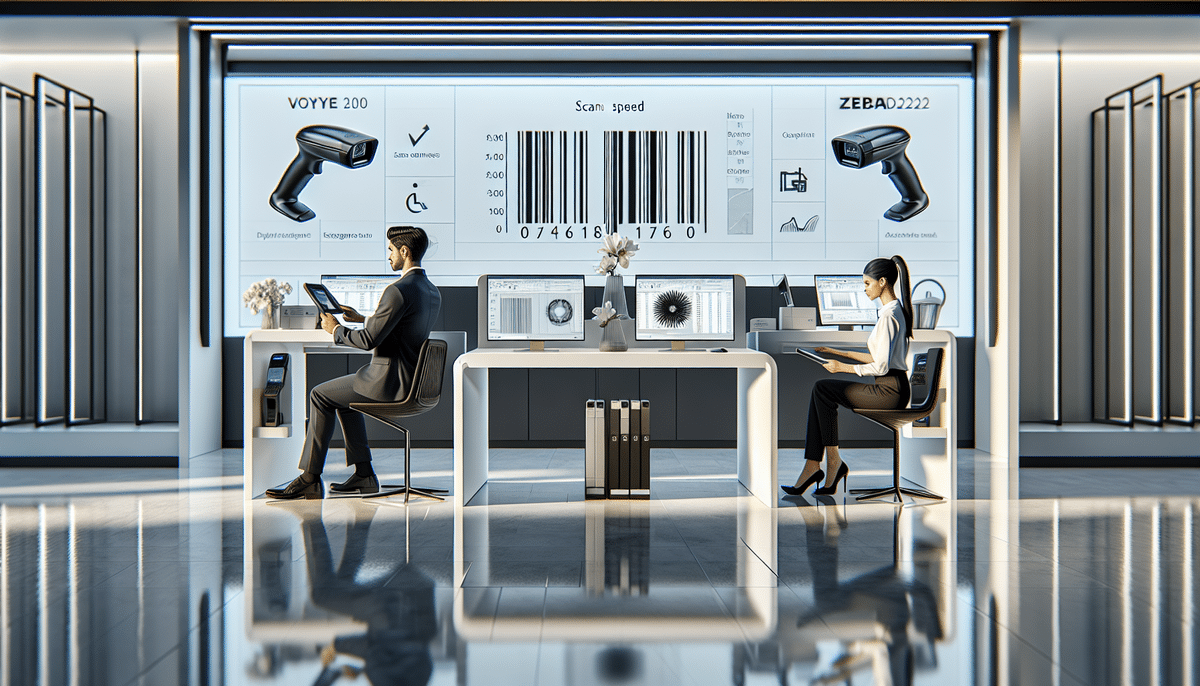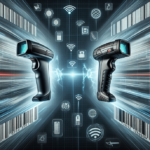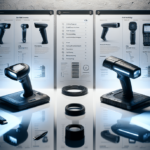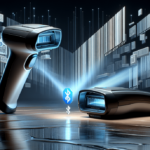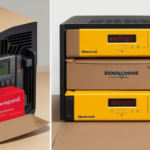Comparing Top Barcode Scanners: Honeywell Voyager 1200g vs Zebra DS2208
Barcode scanners are essential tools for businesses, enabling efficient and accurate tracking of inventory and vital data. Among the leading options in the market, the Honeywell Voyager 1200g and the Zebra DS2208 stand out for their reliability and performance. This comprehensive comparison delves into the features, benefits, drawbacks, and performance metrics of each scanner, providing valuable insights to help you make an informed decision for your business needs.
Understanding Barcode Scanners and Their Importance in Business
Barcode scanners use laser or imaging technology to decode information from barcode labels and transmit it to computer systems. These devices are integral to various industries, including retail, manufacturing, logistics, and healthcare, facilitating inventory management, price verification, product information retrieval, and patient data verification. According to a recent industry report, the global barcode scanner market is projected to grow significantly, highlighting the increasing reliance on these technologies.
Key benefits of barcode scanning include:
- Enhanced Accuracy: Minimizes data entry errors by automating information capture.
- Increased Efficiency: Speeds up processes such as inventory tracking and checkout operations.
- Real-Time Data: Provides up-to-date information on inventory levels and product availability.
- Regulatory Compliance: Assists businesses in adhering to standards like food safety regulations by maintaining accurate product traceability.
By integrating barcode scanners into their operations, businesses can streamline workflows, reduce manual labor, and improve overall customer satisfaction, thereby maintaining a competitive edge in today's fast-paced market.
Honeywell Voyager 1200g: Features and Benefits
The Honeywell Voyager 1200g is a high-performance handheld laser scanner renowned for its exceptional depth of field. This feature allows it to read barcodes from greater distances and wider angles compared to many competitors, enhancing scanning flexibility in dynamic environments.
Key Features:
- Durability: Constructed to withstand drops from up to 6 feet, making it suitable for rugged industrial settings.
- High Accuracy: Achieves a near-perfect read rate of 99.98%, ensuring reliable data capture.
- Customization: Offers adjustable settings such as beeper volume and symbology configurations to tailor the scanner to specific needs.
- Compatibility: Works seamlessly with most operating systems and applications, supported by a comprehensive SDK for custom integrations.
Additionally, the Honeywell Voyager 1200g provides robust software support, enabling businesses to integrate the scanner into existing systems effortlessly. Its ergonomic design ensures user comfort during extended use, reducing fatigue and increasing productivity.
Zebra DS2208: Features and Benefits
The Zebra DS2208 is a versatile handheld scanner equipped with both a laser engine and an imager, catering to a wide range of barcode types including 1D, 2D, QR codes, and PDF417. This dual technology ensures high scanning reliability and flexibility across various applications.
Key Features:
- Versatile Scanning: Capable of decoding diverse barcode formats and capturing images and signatures, ideal for point-of-sale and mobile ticketing systems.
- Extended Battery Life: Offers up to 14 hours of continuous use on a single charge, supporting demanding work environments.
- Connectivity: Equipped with Bluetooth and USB options for easy integration with different devices and systems.
- Design: Compact and lightweight, the DS2208 is designed for comfort during prolonged use.
The Zebra DS2208's ability to handle a variety of scanning tasks makes it a reliable choice for businesses seeking a multifunctional scanning solution. Its durable build ensures longevity, while the efficient battery management system minimizes downtime.
Comparison of Honeywell Voyager 1200g and Zebra DS2208
When evaluating the Honeywell Voyager 1200g and the Zebra DS2208, several critical factors should be considered to determine which scanner best fits your business requirements.
Performance Comparison: Scanning Speed, Accuracy, and Durability
Scanning Speed: The Honeywell Voyager 1200g supports up to 100 scans per second, while the Zebra DS2208 offers up to 50 scans per second. This makes the Voyager 1200g superior in environments where high-volume scanning is necessary.
Accuracy: The Voyager 1200g boasts a read rate of 99.98%, compared to the DS2208's 99%, giving Honeywell a slight edge in accuracy.
Durability: Both scanners are built to endure harsh conditions, with the Voyager 1200g capable of surviving drops from up to 6 feet and the DS2208 from up to 5 feet. Their rugged designs make them suitable for industrial applications.
Ergonomics Comparison: Weight, Comfort, and Ease of Use
Weight: The Honeywell Voyager 1200g weighs 5.3 ounces, while the Zebra DS2208 is slightly lighter at 4.9 ounces.
Comfort: Both scanners feature ergonomic designs that reduce user fatigue during extended use. The Voyager 1200g has an easy-to-press trigger, whereas the DS2208 offers a softer trigger, which may be preferable for users with weaker grip strength.
Connectivity Options: USB, Bluetooth, and Wi-Fi
Both scanners provide multiple connectivity options, including USB and Bluetooth. The Honeywell Voyager 1200g also includes RS232 connectivity, making it compatible with older computer systems. Neither scanner natively supports Wi-Fi connectivity, but Bluetooth offers sufficient wireless flexibility for most applications.
Software Compatibility: Operating Systems and Applications
Both the Honeywell Voyager 1200g and Zebra DS2208 are compatible with major operating systems such as Windows, macOS, and Linux. They integrate seamlessly with a variety of applications, including inventory management systems, point-of-sale (POS) solutions, and mobile ticketing platforms, ensuring versatility across different business operations.
Pricing Comparison: Value for Money
The Honeywell Voyager 1200g is priced higher than the Zebra DS2208. However, its superior scanning range, higher accuracy, and enhanced durability provide better long-term value. Additionally, the Voyager 1200g's lower maintenance requirements and longer lifespan contribute to cost-effectiveness over time.
User Reviews: Pros and Cons of Honeywell Voyager 1200g vs Zebra DS2208
Users generally rate both scanners highly for their accuracy and durability. The Honeywell Voyager 1200g is praised for its robust performance and reliability, though some users find it slightly heavier for prolonged use. The Zebra DS2208 is appreciated for its lightweight design and versatility, but its marginally lower accuracy rate has been noted as a potential drawback.
Environmental Impact Comparison: Sustainability and Energy Efficiency
The Honeywell Voyager 1200g leads in sustainability, being constructed from a significant percentage of recycled materials and holding certifications for energy efficiency. This ensures the device is energy-efficient, reducing its environmental footprint. In contrast, the Zebra DS2208 lacks these eco-friendly features, making the Voyager 1200g a more sustainable choice for environmentally conscious businesses.
Warranty Comparison: Coverage and Support
Both scanners come with a standard three-year warranty. However, the Honeywell Voyager 1200g offers an optional five-year warranty, providing extended coverage for added peace of mind. Additionally, Honeywell is renowned for its exceptional customer support, offering 24/7 technical assistance. Zebra also provides customer support, though some users have reported longer wait times and less responsive service compared to Honeywell.
Choosing the Best Barcode Scanner for Your Business Needs
Selecting between the Honeywell Voyager 1200g and the Zebra DS2208 depends on your specific business requirements:
- Honeywell Voyager 1200g: Ideal for businesses that require high scanning speed, exceptional accuracy, and durability, especially in industrial settings.
- Zebra DS2208: Suited for environments where versatility and lightweight design are priorities, such as retail and point-of-sale operations.
Additionally, consider software compatibility, ease of use, and the training required for your staff. A user-friendly scanner with intuitive software can enhance productivity and reduce training time, leading to cost savings in the long run.
Tips for Proper Maintenance and Care of Barcode Scanners
Maintaining barcode scanners is crucial for ensuring their longevity and consistent performance. Follow these best practices:
- Regular Cleaning: Use a soft, dry cloth to clean the scanner, removing dust and debris that could interfere with barcode reading.
- Protective Handling: Avoid exposing the scanner to extreme temperatures, humidity, or direct sunlight. Use protective cases to shield the device from accidental drops and bumps.
- Firmware and Software Updates: Keep the scanner's firmware and software up to date to benefit from the latest features and performance enhancements.
- Battery Management: Utilize high-quality batteries and monitor their usage to prevent overuse or complete drainage. Keeping spare batteries on hand can minimize downtime.
Proper training for employees on the correct use and handling of barcode scanners is also essential. Educate staff on how to position and hold the scanner effectively, as well as troubleshoot common issues to prevent damage and ensure optimal performance.
Future Trends in Barcode Scanner Technology
The barcode scanner industry is evolving rapidly, with several emerging trends poised to enhance functionality and user experience:
- 3D Imaging and Artificial Intelligence: Advanced imaging technologies and AI-driven algorithms are improving scanning accuracy and enabling the recognition of complex and damaged barcodes.
- Wireless and Mobile Integration: Increased demand for wireless and mobile-friendly scanners is driving the development of lightweight, portable devices that integrate seamlessly with mobile platforms.
- Cloud-Based Systems and Data Analytics: Integration with cloud services allows for real-time data synchronization and advanced analytics, providing businesses with actionable insights.
- Augmented Reality (AR): AR technology is being incorporated to overlay digital information onto the physical environment, enhancing the scanning experience by providing immediate access to product details and reviews.
- Sustainability: Manufacturers are focusing on eco-friendly materials and energy-efficient components, aligning with global sustainability initiatives and reducing environmental impact.
As these technologies continue to advance, barcode scanners will become even more integral to business operations, offering enhanced capabilities that drive efficiency, accuracy, and innovation.
For more information on the latest in barcode scanner technology and to explore the best options for your business, visit ShipScience.













